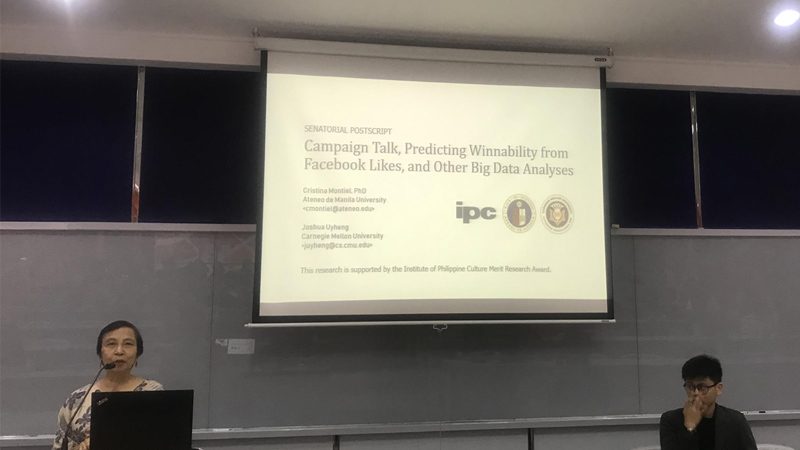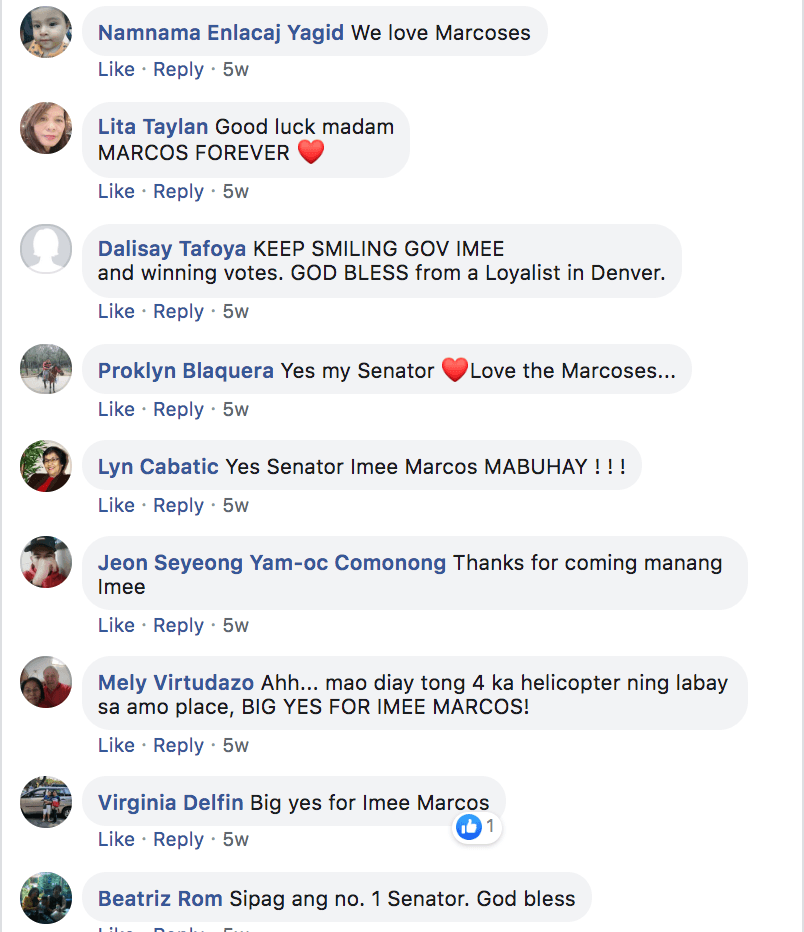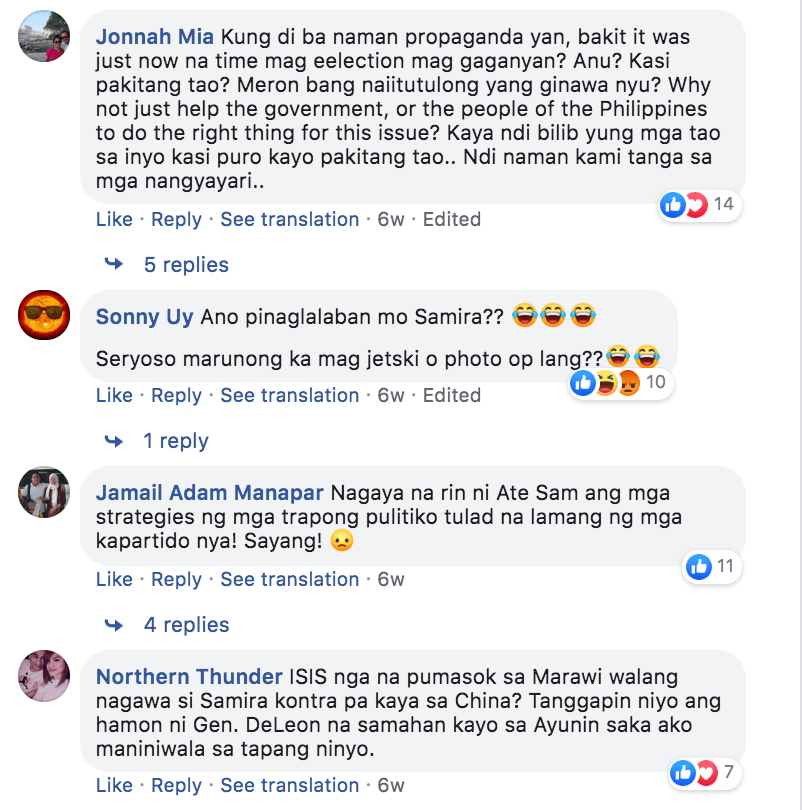SUMMARY
This is AI generated summarization, which may have errors. For context, always refer to the full article.

AT A GLANCE
- Promoting previous legislative achievements was scant for most candidates in the winning circle
- Winning senatorial candidates posted mostly about loyalty and support for the Duterte administration on Facebook
- Opposition senatorial candidates talked about abstract values like peace and justice but also critiqued the administration a great deal
- Administration-backed candidates got more comments of support and admiration from users populating their pages
- More insults and vitriolic discussions were in the comment sections of opposition pages
MANILA, Philippines – Instead of discussing their platforms and legislative agenda, victorious senatorial candidates in the 2019 elections used their Facebook pages to express loyalty and support for the administration, according to a recent study.
The study, titled, “Senatorial Postcript: Campaign Talk, Predicting Winnability from Facebook Likes, and Other Big Data Analyses,” by Cristina Montiel of Ateneo de Manila University and Joshua Uyheng of Carnegie Mellon University, probed into the social media environment on Facebook during the 2019 elections.
The study also found that opposition bets who lost did a lot of negative campaigning. They had a lot of posts about their platforms, however.
“Our findings show that winners and non-winners had very different social media activity,” Uyheng said.
The study showed that the promotion of legislative achievements, which populated some 17% of posts, does not guarantee more votes.
Senatorial candidates Sonny Angara, Nancy Binay, and JV Ejercito were the ones found to promote their achievements the most. Of the 3, Ejercito, who branded himself as Mr Healthcare, did not make it to the Magic 12.
Meanwhile, Bong Go, Francis Tolentino, Jinggoy Estrada, and Bong Revilla did very little to promote their achievements, yet only Estrada did not make it to the winning circle. Go and Tolentino, both from the administration PDP-Laban slate, banked heavily on their relationship with President Rodrigo Duterte.
While campaigning on the ground – not on Facebook – was still the main political battleground for victorious senatorial candidates, the activity on the social media platform revealed interesting trends about electoral conversations in the age of social media. (READ: From experimental to essential? Social media in the 2019 elections)
Currently, the Philippines encompasses a digital population of 75 million active Facebook accounts.
Montiel and Uyheng’s study zeroed in on the Facebook pages of 27 candidates from pro-administration to opposition bets, as well as independent candidates who placed well in surveys. (READ: That new animal: Can Comelec catch up with social media?)
They went over approximately 19,000 Facebook posts and 1.4 million comments.
The research team collected data starting from the filing of certificates of candidacy (COCs) to the month prior to elections, and focused on senatorial candidates’ official campaign pages and comments.
Support or criticize?
Of the thousands of posts analyzed, close to 50% were an “articulation of values.” These ranged from values of loyalty to the administration to peace and justice.
Overwhelmingly, victorious candidates, 9 of whom were administration-backed, used their Facebook pages to express support for the administration. For instance, Cynthia Villar, who topped the polls, had many posts showing her sorties with Sara Duterte’s Hugpong ng Pagbabago.
Opposition bets, none of whom made it to the winning circle, stuck with criticisms of the status quo while also bringing up peace and justice. (READ: Opposition bets failed to counter Duterte strongman myth)
Some 17% of the posts were criticisms of the problems left unsolved by the current administration. Opposition bets Florin Hilbay, Erin Tañada, Neri Colmenares, and Romy Macalintal engaged the most in this activity. They all lost their election bids.
Hilbay, for one, repeatedly challenged Go to prove he was not linked to illegal drugs. It could be said that such practice – an example of negative campaigning – backfired given Hilbay’s low ranking in the polls.
Interestingly, Ronald “Bato” dela Rosa also fell in this category, but the researchers clarified that it was the “status quo of high crime,” and not the administration, which he criticized during the campaign season. This could explain the many votes that he got.
Dela Rosa’s campaign messaging banked on a promise to solve crime in the Philippines, which he already articulated while he was still the Philippine National Police chief.
The study also found that administration-backed candidates received more comments consisting of admiration from supporters.

The comment posts of Otso Diretso bets, on the other hand, were populated by “comments with insulting narratives.” Researchers said they could not establish whether these were all genuine accounts.

The researchers clarified that these insulting comments were both directed at the candidates or were vitriolic discussions among people in the comment threads. For instance, while name-calling directed at candidates was prevalent, so was name-calling among commenters themselves.
The study, in this way, did not just look at how supporters interacted with the candidates but also how supporters interacted among themselves.
As for the implications of the study, Uyheng said that their findings “raise the question now of whether or not adopting the winning strategies will help [future candidates].”
Winning strategies, as the study showed, were: downplaying criticism of, and emphasizing support for, the government. Discussing one’s legislative agenda did not seem to matter that much.
The researchers repeatedly clarified that the study probed into social media, and that it was in no way a direct translation of what kind of conversations happened on the ground. – Rappler.com
Add a comment
How does this make you feel?
There are no comments yet. Add your comment to start the conversation.